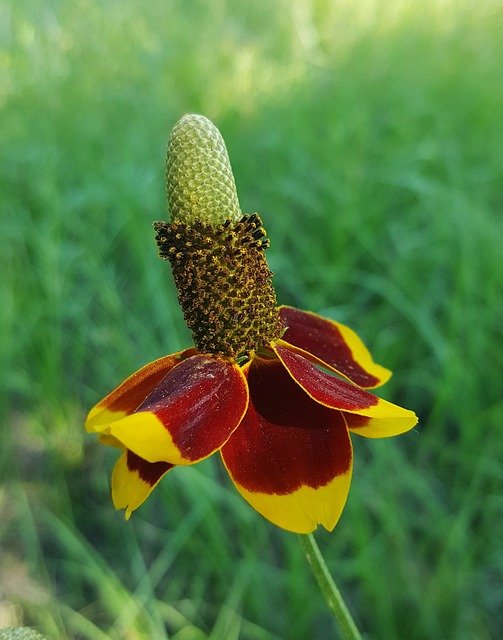Ratibida columnifera (Mexican Hat)
Mexican hat or Prairie Coneflower is a slender aromatic plant, with deeply cut leaves and a flower that resembles a Mexican Sombrero hat, thus it’s common name. It’s native through out most of USA It is most common on the Great Plains - in dry prairies.
Native Americans used it's healing properties : an infusion is used to relieve the pain of headaches and to treat stomach aches and fevers. It was also used as a wash to relieve pain and to treat poison ivy rash and the poison out of a rattlesnake's bite.
This is a great plant for drier sunny borders, native plant areas, dry meadows, prairies or bigger rock gardens. It looks best in groups or masses. It is not particularly long-lived, (especially on more fertile and more wet soil), but it will self seed.
Flower time: July to early October.
Size: 3' tall x 2' wide (much shorter on infertile and dry soils)
Mexican hat or Prairie Coneflower is a slender aromatic plant, with deeply cut leaves and a flower that resembles a Mexican Sombrero hat, thus it’s common name. It’s native through out most of USA It is most common on the Great Plains - in dry prairies.
Native Americans used it's healing properties : an infusion is used to relieve the pain of headaches and to treat stomach aches and fevers. It was also used as a wash to relieve pain and to treat poison ivy rash and the poison out of a rattlesnake's bite.
This is a great plant for drier sunny borders, native plant areas, dry meadows, prairies or bigger rock gardens. It looks best in groups or masses. It is not particularly long-lived, (especially on more fertile and more wet soil), but it will self seed.
Flower time: July to early October.
Size: 3' tall x 2' wide (much shorter on infertile and dry soils)
Mexican hat or Prairie Coneflower is a slender aromatic plant, with deeply cut leaves and a flower that resembles a Mexican Sombrero hat, thus it’s common name. It’s native through out most of USA It is most common on the Great Plains - in dry prairies.
Native Americans used it's healing properties : an infusion is used to relieve the pain of headaches and to treat stomach aches and fevers. It was also used as a wash to relieve pain and to treat poison ivy rash and the poison out of a rattlesnake's bite.
This is a great plant for drier sunny borders, native plant areas, dry meadows, prairies or bigger rock gardens. It looks best in groups or masses. It is not particularly long-lived, (especially on more fertile and more wet soil), but it will self seed.
Flower time: July to early October.
Size: 3' tall x 2' wide (much shorter on infertile and dry soils)
